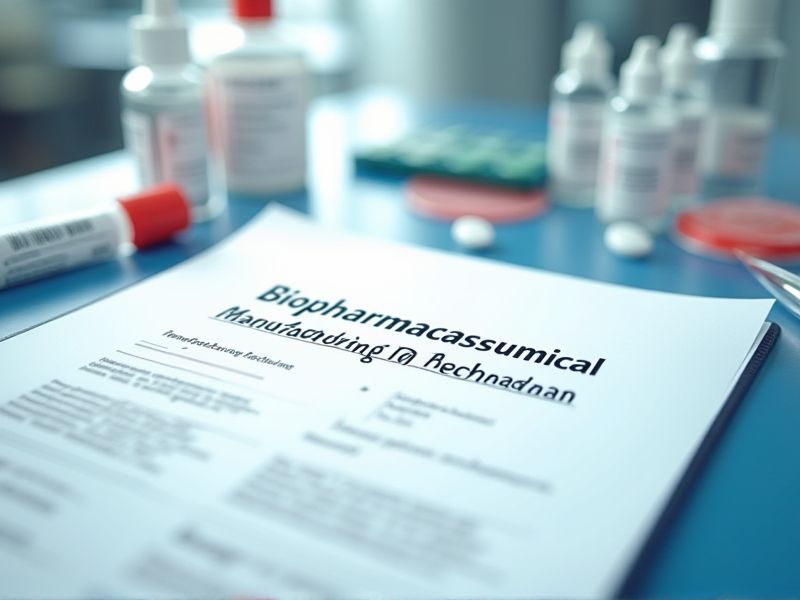
Biopharmaceutical Manufacturing Technicians work with complex machinery and processes essential for drug production. Certifications in this field serve to validate a technician's proficiency and understanding of stringent industry regulations and safety protocols. Key certifications enhance a professional's ability to operate sophisticated equipment and maintain quality standards essential for drug efficacy. Below are some crucial certifications for a Biopharmaceutical Manufacturing Technician.
cGMP Certification
cGMP certification ensures that biopharmaceutical manufacturing technicians adhere to rigorous quality control standards, reducing the risk of product contamination. Compliance with cGMP guidelines helps companies meet regulatory requirements, making it easier to gain market approval for their products. Certified technicians are trained to understand and implement precise documentation and operational procedures, which improves process consistency. This certification increases consumer and stakeholder trust in the reliability and safety of biopharmaceutical products.
FDA Regulatory Compliance Certification
Biopharmaceutical manufacturing technicians require FDA regulatory compliance certification to ensure that the drugs produced are safe and effective, as the FDA sets stringent guidelines for pharmaceutical quality. Compliance with FDA regulations minimizes the risk of manufacturing errors that could lead to adverse effects on patients. Certification equips technicians with the necessary knowledge to maintain consistent product safety and quality standards. The biopharmaceutical industry relies on regulatory compliance to maintain public trust and meet legal obligations.
OSHA Safety Training Certification
Biopharmaceutical manufacturing technicians often handle hazardous substances, making OSHA safety training vital to ensure they understand proper handling and disposal techniques. Exposure to chemical and biological agents can pose serious health risks; therefore, training helps mitigate potential accidents or contamination. Certification ensures technicians are equipped with the knowledge to maintain compliance with regulatory safety standards. A safe working environment translates to reduced downtime from incidents, thereby maintaining continuous and efficient production processes.
Six Sigma Green Belt Certification
Obtaining a Six Sigma Green Belt Certification enables biopharmaceutical manufacturing technicians to apply data-driven methodologies to improve process efficiency and reduce waste. It equips them with skills to identify and eliminate the root causes of defects, enhancing product quality. Biopharmaceutical manufacturing relies on precise regulatory compliance, and Six Sigma tools help ensure adherence to these strict standards. The certification fosters a culture of continuous improvement, essential for innovation and competitive advantage in the biopharmaceutical industry.
Lean Manufacturing Certification
Lean Manufacturing Certification enhances efficiency by teaching Biopharmaceutical Manufacturing Technicians to minimize waste and streamline processes. This leads to reduced production costs and shorter time-to-market, which is crucial in the competitive biopharmaceutical industry. Certified technicians often improve product quality through better process understanding and error reduction. Companies gain a competitive edge by ensuring their workforce is skilled in Lean principles, promoting innovation and compliance with stringent regulatory standards.
Quality Assurance (QA) Certification
Quality Assurance (QA) Certification is needed for Biopharmaceutical Manufacturing Technicians because it ensures they meet industry standards for safety and regulatory compliance, reducing the risk of errors in drug production. Certified technicians have a clearer understanding of Good Manufacturing Practices (GMP), which is critical for maintaining the integrity and efficacy of pharmaceutical products. Certification often leads to higher productivity and efficiency, as technicians are better equipped to handle complex processes and problem-solving. In a highly regulated field, certified technicians offer pharmaceutical companies a competitive advantage by enhancing the credibility and reliability of their manufacturing operations.
Pharmaceutical Quality Control Certification
Pharmaceutical Quality Control Certification ensures technicians possess the necessary skills to maintain the safety and efficacy of biopharmaceutical products. Rigorous standards reduce the risk of contamination, which is crucial in biopharmaceutical manufacturing where product purity directly affects patient health. Certification also supports regulatory compliance, helping organizations meet the stringent guidelines set by health authorities like the FDA. It enhances job readiness, as certified technicians are more adept at handling complex manufacturing processes.
ISO 9001 Auditor Certification
ISO 9001 Auditor Certification ensures standardization in quality management processes, crucial for maintaining consistency in biopharmaceutical manufacturing. The certification helps technicians recognize and address inefficiencies, improving production accuracy and reducing waste. Understanding ISO 9001 guidelines also fosters an enhanced compliance culture, crucial for meeting regulatory requirements in this highly regulated industry. Equipped with audit skills, technicians can proactively identify risks, bolstering product safety and efficacy.
Good Laboratory Practices (GLP) Certification
Good Laboratory Practices (GLP) Certification is crucial for biopharmaceutical manufacturing technicians as it ensures compliance with stringent industry and regulatory standards, resulting in higher product quality and safety for consumers. Without GLP certification, inconsistencies and deviations in laboratory operations can lead to inaccurate testing results, compromising product efficacy. Certification also enhances the credibility and reliability of a technician's professional skills, making them more valuable to employers and stakeholders. As biotech companies increasingly focus on global markets, GLP certification helps facilitate international acceptance and distribution of therapeutic products.
Regulatory Affairs Certification (RAC)
Achieving Regulatory Affairs Certification (RAC) for a Biopharmaceutical Manufacturing Technician increases regulatory compliance knowledge, which is critical in ensuring that production processes meet industry standards and legal requirements. Completing the RAC program provides a competitive edge, as it signifies specialized skills in navigating the complex regulatory landscape of biopharmaceuticals. With RAC credentials, technicians effectively contribute to minimizing the risk of costly regulatory violations impacting operational efficiency. Certification ensures ongoing professional development, equipping technicians with up-to-date regulatory knowledge crucial for adapting to evolving industry legislation.
Summary
When you obtain certifications as a Biopharmaceutical Manufacturing Technician, your employment opportunities likely increase, making you more competitive in the job market. Employers generally prioritize candidates who demonstrate validated skills and expertise, possibly leading to higher starting salaries. Certified technicians often see enhanced career advancement potential as they stand out in a highly regulated industry. This can lead to improved job stability and reduced turnover risk, benefiting both you and your employer.
